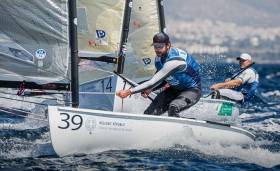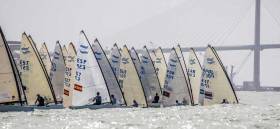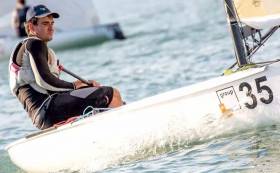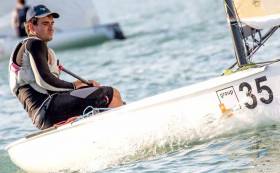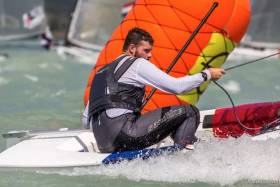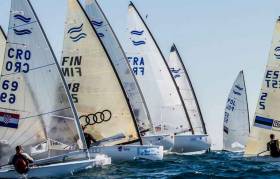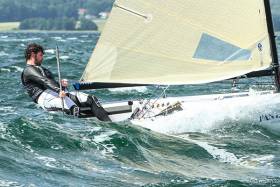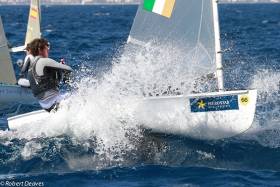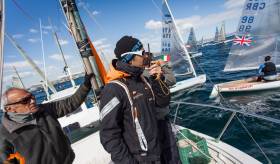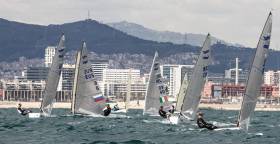Displaying items by tag: Oisin McClelland
Irish Finn Sailors Sign Open Letter To World Sailing Over Class Removal From Paris 2024
Fionn Lyden and Oisin McClelland — who are currently competing at the Finn Europeans in Athens — are among dozens of concerned Finn sailors who have put their names to an open letter to sailing chiefs over the removal of their class from the 2024 Olympic Games in Paris.
The letter’s release coincides with the start of World Sailing’s Mid-Year Meeting in London today (Friday 17 May), and follows a similar appeal by the International Finn Association ahead of the AGM for sailing’s world governing body last November.
That was prompted by an 11th-hour move by World Sailing decision makers to replace the Mixed One Person Dinghy event (in which men sail the Finn class) with a two-person keelboat class to be determined, overturning a previous decision in May 2018.
In its statement at the time, the Finn class body said the decision “is further driving our sport into expensive elitist Olympic events which will result in the decrease of universality and participation in Olympic sailing”.
The latest letter, from a group providing the email address [email protected], is attached below, and the text can be read here:
To whom it may concern,
We are writing to express our deep concern regarding the removal of the Finn class from the 2024 Olympic Games by World Sailing and to request the reinstatement of a class suited to male athletes over 85 kilograms.
While we understand that the main reason behind this decision was to give preference to mixed event categories, removing the Finn class eliminates a massive Olympic sailing group which includes every single male athlete over 85 kilograms. Historically, athletes of this category have significantly contributed to the sport and this category’s popularity continues today. At the recent Aarhus Sailing World Championships in Denmark, 42 nations gathered and participated with athletes in the Finn class, making the Finn the third largest class at the competition.
Not only is the Finn class’s popularity undeniable and the removal of this class a detriment to the Olympic Games, but it also discriminates against many sailors. Despite the initial working party and the World Sailing Events Committee Chairman’s expressed respect for World Sailing’s Regulation 23 and the ‘all physique’s’ policy 70/17, the category of men over 85 kilograms has been discriminated against and effectively barred from competition due to the equipment specifications. For further evidence of this detrimental phenomenon, please see page 17 of the attached document, which illustrates that all male sailors fall into the 70-85 kilogram bracket.
The removal of the Finn class from the Olympic Games breaches World Sailing rules and policies and disregards the principles of the Olympic Charter with respect to non-discrimination of physiques, and limits access to many sailors. Therefore, we urge you to reinstate a class, like the Finn, suited to male athletes over 85 kilograms in order to guarantee the fair access to all sailors and in order to avoid the implementation of discriminatory decision from World Sailing.
In the hope that a correction will be provided without the need for further action, we remain at your disposal for a constructive dialogue on this matter at the address shown in the header of this letter.
Donaghadee's McClelland 14th in First Race of Finn Euros
Donaghadee Sailing Club's Oisin McClelland opened his Finn Europeans Championships account with a 14th after a first day of big waves and light winds for the Ulsterman in Cadiz, Spain.
McClelland is the only Irishman in the 89–boat Olympic class fleet following the withdrawal of Baltimore's Under–23 Finn Bronze Medalist, Fionn Lyden, due to illness.
Nicholas Heiner, from The Netherlands, won the only race possible on the opening day. Caleb Paine, from the USA, and Facundo Olezza, from Argentina are joint second.
With 30 U23 sailors, it is the largest youth fleet at the Europeans for some time. 2015 Junior World Champion, Ondrej Teply, from Czech Republic leads from Joan Cardona Mendez, of Spain and Guillaume Boissard, of France.
A three metre swell, left over from the storm that caused Sunday's practice race to be abandoned, made for an interesting day in the Bay of Cadiz, but the light and patchy winds meant that only one race was completed, with the second race abandoned near the end of the first upwind.
Defending champion Jonathan Lobert said, "It was a tricky day with big waves and light winds. The waves were much bigger then the wind. I had a wonderful start and was leading by miles on the left side of the course and I don't know what happened but fifty metres before the top mark I suddenly lost all my lead, but then I managed to survive to finish fourth, so not too bad for a day like today."
Three races are scheduled for Tuesday, with the forecast showing stronger winds and rain. The first warning signal is scheduled for 11.00
Results after one race:
1. Nicholas Heiner, NED
2. Caleb Paine, USA
3. Facundo Olezza, ARG
4. Jonathan Lobert, FRA
5. Oliver Tweddell, AUS
6. Josh Junior, NZL
7. Alican Kaynar, TUR
8. Piotr Kula, POL
9. Edward Wright, GBR
10. Ondrej Teply, CZE
Full results here.
Fionn Lyden Pulls Out of Finn Europeans Due To Illness
Illness has forced Balimore’s Fionn Lyden to withdraw from the Finn Europeans getting underway in Cadiz today, Friday 9 March.
Irish Sailing’s James O’Callaghan confirmed the news as sailors from across Europe take to the waters of Andalusia ahead of the first races next Monday.
Lyden’s illness means that Oisin McClelland of Donaghadee Sailing Club will be the only Irish representative among the near 100-strong field as he progresses his Tokyo 2020 campaign.
Afloat.ie has more on the first big test of the year for Finn sailors gearing up for the Olympic qualifier this summer in Denmark.
Irish Finn Sailors Countdown to Europeans in Cadiz
Ireland has two sailors among the ninety-six Finn sailors from 33 countries counting down the days to next week's Open and U23 Finn European Championship in Cadiz, Spain.
Oisin McClelland from Donaghdee Sailing Club and Fionn Lyden from Baltimore Sailing Club are both contesting the championships as part of their campaign towards Tokyo 2020. See the entry list here.
UPDATE: Fionn Lyden is no longer taking part due to illness.
Many of the Finn sailors involved have been training for months at the venue for the first big test of the year as the fleet gears up for the first Olympic qualifier in Aarhus, Denmark in August.
The high-calibre fleet includes 12 Rio Olympians, three former world champions and three former European champions. The defending champion is Jonathan Lobert, from France, the London 2012 bronze medalist, who took the gold in Marseille last year, the sailing venue for the 2024 Olympics.
Some of the biggest threats for Lobert's title defence are likely to come from current World Champion, Max Salminen, from Sweden, last year's second and third placed, Ed Wright and Ben Cornish, from Britain, Rio bronze medalist Caleb Paine, from the USA, Australian, Jake Lilley, and Alican Kaynar from Turkey.
Kaynar won last week's Andalusian Olympic Week and has shown steady improvement since the Rio Games, including a bronze in Miami earlier this year.
The championship opens on Friday 9 March, with a series of 10 races from Monday 12 to Friday 16 March, followed by the medal race for the top ten on Saturday 17 March.
More on the event website HERE.
Top 50 Finish For McClelland & Lyden At Finn Gold Cup
#Finn - Fionn Lyden and Oisin McClelland both secured a top 50 finish at the 2017 Finn Gold Cup, which came to a close in Hungary yesterday (Sunday 10 September).
Baltimore’s Lyden, at 40th, finished seven places ahead of Donaghadee’s McClelland, his chief rival for a coveted spot for Ireland in the Finn class at Tokyo 2020.
Max Salminen from Sweden claimed his first Finn world title in a close and intense medal race between the top 10 sailors yesterday, one that sailed despite a persisting light breeze.
For the Irish, however, the competition was decided by day four, with lack of wind seeing racing cancelled on Thursday 7 and Friday 8 September.
McClelland, who was competing in his second Finn Gold Cup, is one of three sailors receiving support through the Finn Class Development Programme (FIDeS), which includes part-funding to train at the Dinghy Academy in Valencia.
The Northern Irish prospect has already spent most of 2017 training in Valencia with the new group that has formed there.
“We got some pretty good training in over the summer,” he told the Finn class’ Robert Deaves. “After the European Championship [in Marseille, in May] I felt that I had made a big step forwards in boat speed and set up.”
Though he fell short of his goal of a top 30 placing in Hungary, McClelland is confident that continued training and experience in big events with tricky conditions, such as those the fleet dealt with last week, will see the desired results.
“There has definitely been glimpses of speed and getting where I’d like to be,” he said, noting one highlight was leading the fleet round the first mark in the first race of the series.
“The FIDEs funding has been a big help this season, giving me a more stress-free time to train and not worry about the money.”
Next for McClelland is a solid winter of training in Valencia. “I think this season was a lot of building,” he said. “I learnt a lot, made some steps and next year I just have to put it all together and move forward.
“Obviously the goals are a bit higher next year, but the progress is still there. I am still making progress every day I am on the water.”
McClellan also spoke highly of his rival Lyden, who came into the Finn Gold Cup on the back of a bronze ay the U23 Worlds at the same venue on Balaton.
“With another competitor from the same country, it’s going to make you wake up better in the morning. When you are feeling a bit groggy in the morning it’s definitely great motivation.
“We get along well and we are making plans to train together next season as well.”
A 28 and a 32 scored at the 53–boat Finn 2017 European Open Championships leave Ireland's Oisin McClleland from Donaghdee Sailing Club in 29th overall. The Northern Ireland solo sailor is competing at the Yachting Club de la Pointe Rouge, Marseille, France. The competition includes an Under–23 division.
Ed Wright from Great Britain opened the 2017 Championship with two emphatic race wins after a strong mistral kept the fleet on shore for most of the day. France's Jonathan Lobert was consistent with two fourth places to sit in second, while two fifth places for Anders Pedersen of Norway leaves him in third overnight.
After the practice race was abandoned yesterday, the mistral was still in place for the first full day of racing and though the early indication was that racing would start on time, this was soon rethought as gusts of 37 knots and a very steep sea was recorded on the race area. So the fleet sat on shore under AP under mid afternoon, when finally the wild wind abated slightly, but enough to get some racing underway, though the wind was still topping out at 30 knots.
Each race started with one general recall and then the black flag. The race was really one of two halves: in the starting area big waves and 25 knot winds; at the top mark, 10 knots, flat water and 60 degree shifts, with the windward mark set a few hundred metres of the high ground of L'ile de Pomegues.
The first race was initially led by class veteran Rob McMillan, now of Australia, who had a 30 second lead round the top mark. However his training partner, Wright, had taken the lead on the second upwind to extend down the reaches for his first win of the day, followed by Hungarian Zsombor Berecz and Ben Cornish of Great Britain.
The second race was much the same with the strong winds at the start line giving way to huge random shifts the further the fleet progressed up the course. This time Wright led all the way round, to win from Sweden's Max Salminen and the young Nenad Bugarin from Croatia.
The fleet finally came ashore after 19.00, exhausted, but happy after an awesome day of Finn sailing.
Racing in the opening series continues until Saturday, with the Semi-final and Final scheduled for Saturday afternoon.
Top ten after two races
1. Edward Wright, GBR, 2
2. Jonathan Lobert, FRA, 8
3. Anders Pedersen, NOR, 10
4. Max Salminen, SWE, 11
5. Ben Cornish, GBR, 11
6. Zsombor Berecz, HUN, 12
7. Milan Vujasinovic, CRO, 17
8. Oliver Tweddell, AUS, 19
9. Ioannis Mitakis, GRE, 21
10. Henry Wetherell, GBR, 21
If Finn sailors are looked upon as the giants of the sailing world, then Oisin Mcclelland (IRL) is a giant among Finn sailors writes Robert Deaves. At his second and final Finn Silver Cup this week in Aarhus he is using the event as a marker to assess his progress since he first stepped into the Finn just over a year ago. His plan is then to step up his campaign to qualify Ireland for the Tokyo 2020 Olympics and return to Aarhus in two years time for the first Olympic qualification event.
Oisin Mcclelland was always going to be a big man. “I started in the Laser at 16 and was quickly into the standard rig and soon ended up too big for a large part of my standard sailing. I jumped into the Finn last year – the 2015 Silver Cup was my first event. It was a baptism of fire but since then I have spent the last eight months training full time in the Finn at the Dinghy Academy in Valencia.”
He says the Finn was a natural fit to his physical size and intense physicality. “It always looked to me to be the boat I’d fit into because at my height I wouldn’t be the right weight for the Laser, and also the physicality of the boat was always an attraction. The guys at the top are some of the fittest athletes about and that’s really good motivation for those of us coming through. It’s cool to watch them and race against them.”
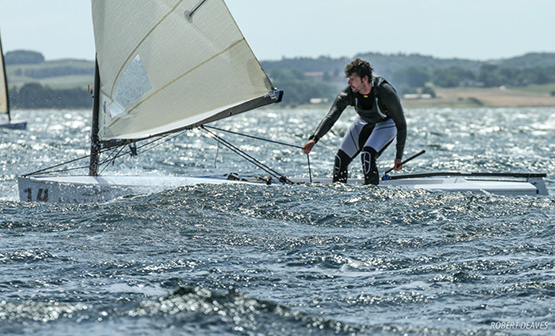 Oisin Mcclelland Finn – 'Every time I get in the Finn it’s a pleasure to sail' Photo: Robert Deaves
Oisin Mcclelland Finn – 'Every time I get in the Finn it’s a pleasure to sail' Photo: Robert Deaves
This year he sailed his first major Finn events, the Europeans in Barcelona, the Princesa Sofia in Palma and the World Championships in Gaeta. “It’s been a huge learning curve but I feel like I have made progress and it was absolutely the right decision.”
Now he is making plans and looking further into the future. “Obviously the goal is to get to Tokyo representing Ireland. It’s great to be in Aarhus this week because it’s going to be the first real test to see if we can get a spot for the Games. The big goal at the moment to be in the best shape for that, and hopefully qualify yourself first time. So the next four years are going to be the most important time in the sport for many of us here.”
Oisin McClelland vital statistics:
Age – 22 • Weight – 100 kg • Height - 198cm
He feels like he is making good progress towards that goal. “At the moment after 12 months in the boat I feel like a lot of things are coming together and I am looking for a couple of good results in the coming season.”
“I have had a lot of support from the RYA NI and the Irish association. And they have been guiding me for the last 6-8 months. I also received a bit of help from the Mary Peters Trust in Northern Ireland. They are a charity that helps local athletes and sportsmen, and they have been a really big help and through their Make it Happen fund I got some money and it got me through to the end of the season this year and enabled me to get to the big events.”
Mcclelland is also part of the FINNTEAM, a funding programme of the International Finn Association to develop young sailors. “We’ll see where that ends up but it’s definitely good for promotion.”
“When I jumped into the Finn in Valencia you were surrounded by guys who had already qualified for the Games, so there was a real intensity going as they geared up for Rio and that gives you an insight into what you have to do get to Tokyo in four years time.”
“The guys there have been beyond helpful and that’s really accelerated the learning curve. I feel like I am making big jumps.”
He hopes to return to Aarhus several times before the 2018 Sailing World Championship. “The goal would be to get to Aarhus as much as possible as possible over the next two years. As we’ve seen here this week there is a lot to learn. It’s definitely going to be a challenge but it’s a great place to sail.”
Due to his size he’s always had an advantage in the breezy conditions. “It’s definitely one of my strengths, but I don’t like to see myself as a heavy weather sailor because then you end up just focussing on that. So currently one of my main focuses is the lighter winds, the right setup, the techniques I need. If I can hold on in the lighter stuff I know when the breeze comes in I stand a good chance of being around the front of the fleet.”
The main attraction for him is the daily challenge. “Every day I am in the boat it’s a challenge. Whether it’s light or windy, it’s either in your head or improving your physicality, and in the breezy stuff like yesterday, it’s a brilliant boat. Every time I get in the boat it’s a pleasure to sail. Also you’ll see in the results this week the calibre of the fleet – they are all mixing it with the top of the senior fleet as well so to come here for a junior event and have this high calibre in the fleet is incredible. You are not given an inch by anybody and having to fight for every position.”
“This time last year when I stepped into the Finn for the first time, Tokyo was there on the board as the dream goal and the plan was laid out. I think if I execute that plan properly, I‘ll see myself there in four years time.”
Donaghdee's Oisin McClleland Crashes Through Palma Waves
Northern Ireland sailor Oisin McClleland makes a splash on the cover of the latest Finn newsletter. The Donaghdee dinghy helmsman is aiming for the 2020 Olympics in Tokyo and has been part of a crowd–funded campaign to introduce more nations to the heavyweight Olympic dinghy. In its opening photo by Robert Deaves this morning, McClleland crashes through a wave in Palma at the Trofeo Princesa Sofia Regatta.
Meanwhile, the Finn Class line up for the 2016 Olympic Games is nearly complete. There will be on Irish representation for 2016. Ireland's last Olympic representation in the class was David Burrows in 2004 in Athens and Timothy Goodbody in Qingdao 2008.
The country qualifiers are over and now it is about national selection and taking up of places.
GBR, CRO, FRA, NZL, USA, NOR, SWE, DEN, SLO, AUS, HUN and FIN qualified in Santander in 2014. NED, GRE, EST and URU qualified in Takapuna 2015. ITA qualified from the Takapuna result as there was no new Oceania nation present in Melbourne. CHN qualified from the Asian qualifier in Qingdao. ARG and CAN qualified for the continential places for North and South America at the Sailing World Cup Miami in January. Finally at the last continental qualifier in Palma, TUR won the European place and SEY won the African place. A lot of battles along the way but 23 nations with a ticket to Rio.
Northern Ireland Finn Dinghy Sailor Lies 46th at Euro Champs
Oisin McClleland of Dongahdee Sailing Club lies 46th from 90 as the last day of the Finn European Championships in Barcelona concludes today. The Northern Ireland Sailors best result of the series so far is a 26th in race four.
Yesterday's day five had it all. Anticipation, excitement, disappointment and high drama. Pieter-Jan Postma (NED) takes the overall lead for the first time and goes into the final day with a ten point lead over his training partner Josh Junior (NZL). Milan Vujasinovic (CRO) is back up to third.
Though the forecast was for a weak wind again, most of the sailors expected a nice sea breeze to come in later in the day and after a brief postponement the fleet was sent out for two races in a 6-9 knot wind that provided tricky racing and lot of mixed fortunes.
Egor Terpigorev (RUS) showed up at the the front of the fleet for the first time, leading round the top mark in Race 5 from Ben Cornish (GBR) and Postma. Cornish had a narrow lead at the gate but Postma led at the end of the next upwind to set up an exciting final leg.
Cornish explained, “I got off the start quite well and got in phase with the shifts. Then the top five or six managed to break away from the fleet and we had some really close battles. It was just a case of getting it right on the last downwind. We managed to push out to the left and the wave direction was making it easy for me to gain. I felt as if I had control out there and the last reach to the finish was really exciting. As it happened PJ and I ended up neck and neck on the line and I just managed to get the last wave across the line.” Terpigorev sailed a great race to cross in third.
With the breeze still looking good, Ioannis Mitakis (GRE) led round the top in Race 6 from Postma and Ondrej Teply (CZE). The Greek sailor held the lead until the final downwind when with the leaders well split and the wind starting to turn patchy, it was anyone's race. Jonas Høgh-Christensen (DEN) came in with the best pressure to slip round the final mark ahead of Vasilij Zbogar (SLO) and Mitakis. A sixth place for Postma was enough to retain the championship lead he had gained after the first race of the day.
Høgh-Christensen said, “The first race was super tricky. I had a bad start and the wind went left and I thought it was going to go right so I rounded in about 70 something and caught back up to 29th. The second race was much better for me. I had a good start and worked the left side of the course and came up to the first mark in fourth and I think I rounded the bottom in third. I was second at the top and ended up winning the race, so that was super.”
“They were really tricky conditions. I think there were two seas breezes fighting each other and it could go hard right or it could go left, so it was really hard to call which way it would go. I didn't get it right in the first but I did in the second.”
“The fleet here is very strong here are only a few guys missing, and people are fighting hard. It's a high scoring regatta but I'll keep on fighting.”
Cornish drops from third to fifth after a bad second race. “It was a day of two halves. To sum the week up in one word it's been difficult. The breeze has been far from simple. The gains have come in from the sides, so you really have to make sure you are 100 per cent aware of what is going to happen next. And I definitely wasn't aware in the last race, but you can't get it right all the time I guess.”
Of his expectations he said, “A top 10 would be a realistic finish for me. I finished just outside that in New Zealand at the Gold Cup and I was bit disappointed with that as I threw a bit away on the last day. I just want to put together a series that will leave me in touch with the front of the fleet.”
Also added to the mix today was the penultimate day of the US Olympic selection trials. Zach Railey (USA) and Caleb Paine (USA) were neck and neck and locked together all through Race 5, but after the discard came into effect, Paine had a ten points lead. Then in Race 6, Railey got the perfect start at the pin and looked to have the advantage.
However a poor second beat from him and a great one from Paine left them only a few boats apart at the final top mark. Then Railey got a yellow flag and on the last run they started jousting and it looked like something was going to happen. Railey then introduced a mark trap on Paine and prevented him from rounding letting about 50 boats sail past. By dragging Paine back through the fleet, Railey had forced them to both count their discards. This moved Railey back into a 10 point lead over Paine.
They ended up in the protest room so results are still provisional.
Overall leader Postma was happy to be in the lead but also mulling over the missed opportunities to be even further ahead. “It was super tricky, and very hard racing but it's going well. I am winning and my training partner Josh Junior is second, so I am very happy with that.”
On the final day he said, “In a 100 boat fleet you have a put in a good race again. You cannot play it safe. Of course I will keep an eye on which corner JJ [Junior] goes but there are other guys also in the hunt. I'll just try for a great start and play the beat and I'm looking forward to it.”
The championships will draw to close on Saturday with the final fleet race for everyone, with the warning signal time brought forward to 09.30 to make the best of the morning wind. When that has been sailed, the medal race for the top ten will be sailed as soon as possible.
Ireland's Oisin McClelland Lines Up For Finn Euro Battle
Oisin McClelland of Donaghdee Sailing Club is Ireland's sole represtative at the 2016 Finn Senior and Junior Open European Championship that opened Saturday night in a cozy ceremony on the balcony of the Barcelona International Sailing Centre overlooking the blue waters of what will become this week's race course.
On Sunday the sailors completed last minute preparations and measurement before the practice race in what could well be the best wind of the week.
The weather so far has been good for the sailors with challenging, offshore moderate to strong winds and blue skies. However some forecasts for the coming week show a different kind of challenge with light winds moving in. The practice race was held in near perfect conditions with the impressive sailing centre structure as a backdrop. Max Kohlhoff (GER) led round the top mark in an onshore and cold 10-12 knots but as usual the fleet only did the first lap before heading in. Josh Junior (NZL) showed some good downwind speed to lead the fleet back to the club.
At the close of the day 90 sailors, including 21 Juniors, had registered to compete in what will be one of the most intense weeks racing of the year. Many nations are using the week as part of their Olympic trials process and many also also using it as a final warm up to the last Olympic qualifier in Palma at the end of the month.
The championship is being organised by “Federació Catalana de Vela (FCV), Unió de Federacions Esportives de Catalunya (UFEC), Reial Club Marítim de Barcelona and Reial Club Nàutic de Barcelona, supported by the City Hall of Barcelona and Generalitat de Catalunya.
At the Opening Ceremony, the dignitaries present included Mr. Xavier Torres (President of the Catalan Sailing Federation), Mr. Oriol Marcé (Subdirector of Sports Activities of the Generalitat de Catalunya), Mr. Jordi Sans (General Director of UFEC), Ms. Sònia Güell (Vice-President of the Real Club Marítimo de Barcelona) and Mr. Aleix Ballester, Race Director for the Finn Europeans. The fleet was especially pleased to see Jose Maria Van Der Ploeg, who won Olympic gold in these waters back in 1992.
Racing begins Monday with ten races scheduled until next Saturday when the final race and the medal race will be sailed. The first race Monday is scheduled to start at 12.00.



























